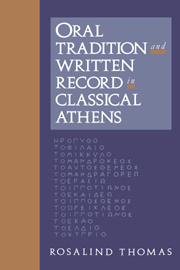Book contents
- Frontmatter
- Contents
- Acknowledgements
- Abbreviations
- Introduction
- 1 LITERACY, WRITTEN RECORD AND ORAL COMMUNICATION
- 2 FAMILY TRADITION
- 3 GENEALOGY AND FAMILY TRADITION: THE INTRUSION OF WRITING
- 4 OFFICIAL TRADITION? POLIS TRADITION AND THE EPITAPHIOS
- 5 THE LIBERATION OF ATHENS AND THE ‘ALCMAEONID TRADITION’
- Epilogue
- Appendix: Early Greek lists
- Chronological table
- Bibliography
- Index
4 - OFFICIAL TRADITION? POLIS TRADITION AND THE EPITAPHIOS
Published online by Cambridge University Press: 03 December 2009
- Frontmatter
- Contents
- Acknowledgements
- Abbreviations
- Introduction
- 1 LITERACY, WRITTEN RECORD AND ORAL COMMUNICATION
- 2 FAMILY TRADITION
- 3 GENEALOGY AND FAMILY TRADITION: THE INTRUSION OF WRITING
- 4 OFFICIAL TRADITION? POLIS TRADITION AND THE EPITAPHIOS
- 5 THE LIBERATION OF ATHENS AND THE ‘ALCMAEONID TRADITION’
- Epilogue
- Appendix: Early Greek lists
- Chronological table
- Bibliography
- Index
Summary
We can now turn to the more general traditions of the whole community or city-state, the polis traditions of the fifth and fourth centuries. Compared to family tradition and its transmission, the general polis traditions are exceedingly complex. Yet, these are the traditions which must have formed the usual view or memory of the past, the Greek equivalent of ‘national’ history. How did a city-state remember or create a picture of its own past from oral tradition alone? Were there official traditions and official ‘memory men’ such as we meet in anthropological studies? How were any general traditions transmitted at all and by what groups of people?
In fact, as with family tradition, the wider oral traditions in Athens seem particularly fluid also, and it is questionable how far it had an ‘official tradition’ at all. The same is probably true of many other Greek city-states. Against the complexity of the general polis traditions and of any general oral traditions, to which I shall return in the next chapter, I concentrate here on the Athenian epitaphios or public funeral speech, which comes nearest to an ‘official tradition’. It forms an extreme example of Athenian polis tradition and is most illuminating for oral tradition and the way it is formed. As for the complicated web of popular tradition, individuals' knowledge and the polis traditions of the assembly, Chapter 4.1 discusses some of the general problems, introducing certain important characteristics of these polis traditions, mainly as a background to the official tradition; and briefly discusses the form and character of the epitaphios.
- Type
- Chapter
- Information
- Oral Tradition and Written Record in Classical Athens , pp. 196 - 237Publisher: Cambridge University PressPrint publication year: 1989
- 1
- Cited by



